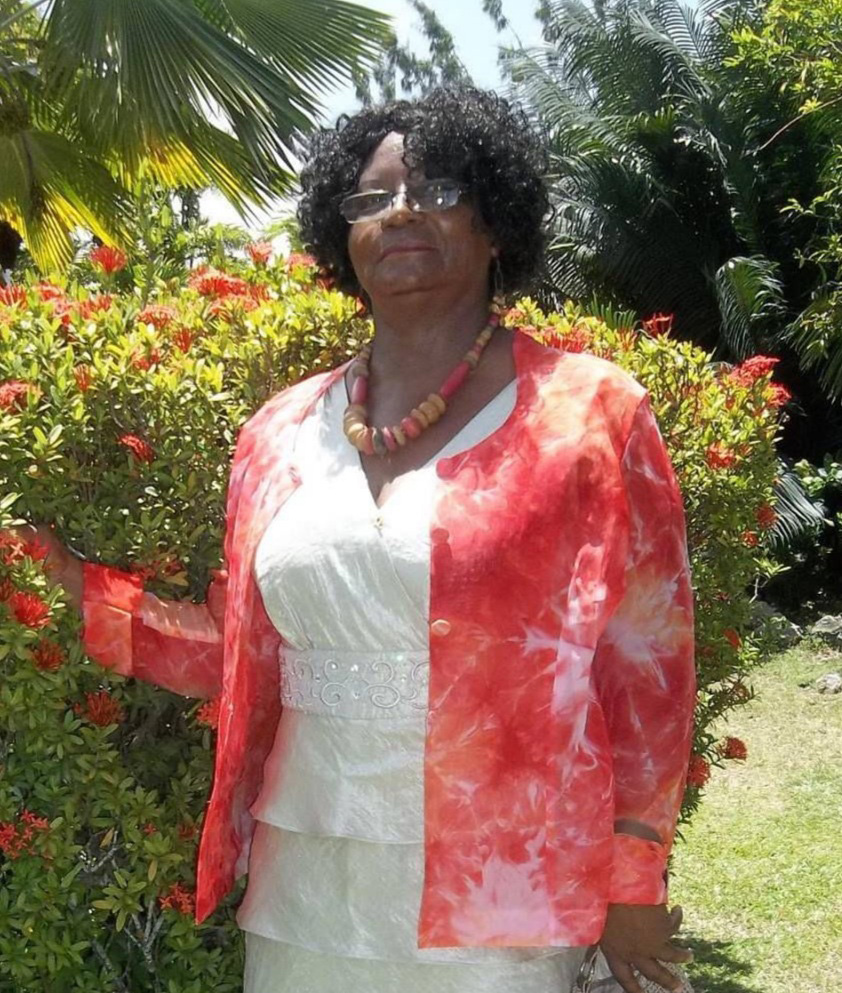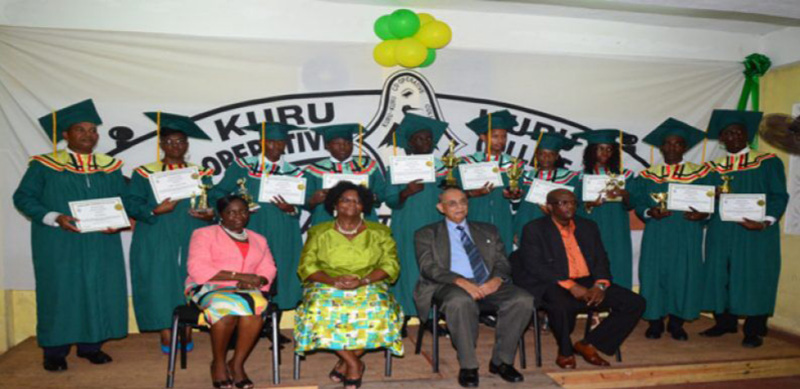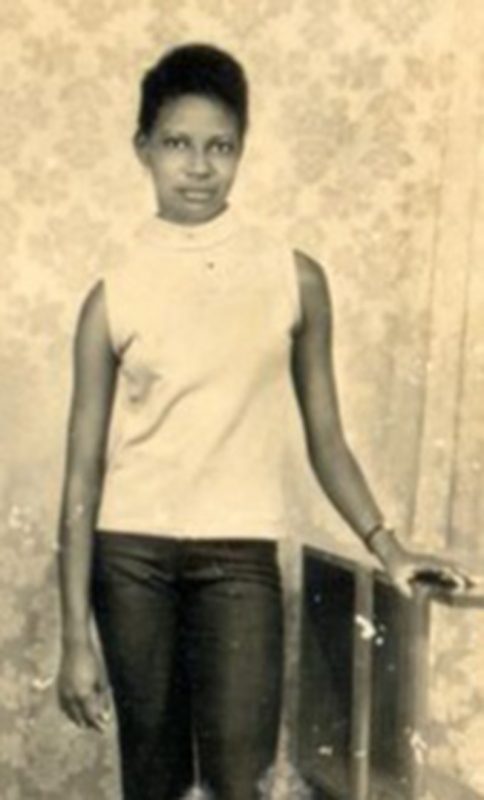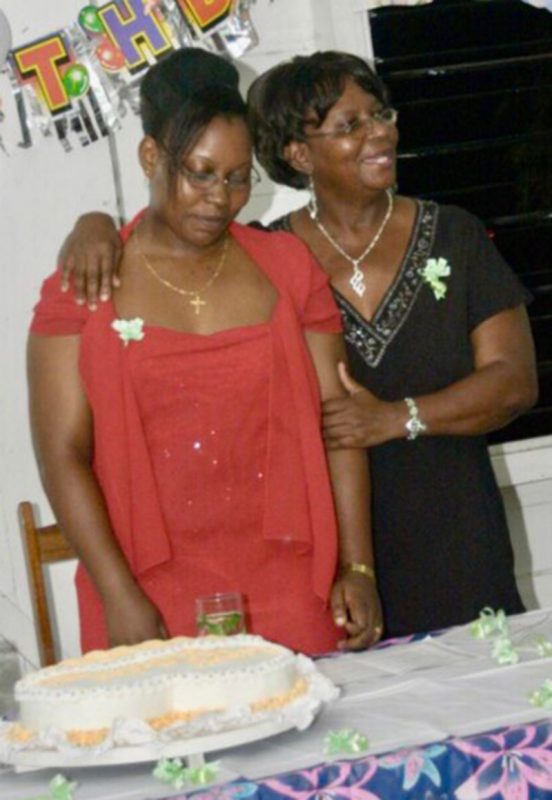Over the years, Myrtle Richards has worked to help others who could have fallen by the wayside to gain an education and life skills.
At 71, Richards, an educator and life coach, is still helping others in many ways.
Richards herself could have been like one of the students she helped over the years as she was forced to drop out of secondary school.
“I was among the first batch of students to attend then East Ruimveldt Government Secondary School. My father died when I was 15 years old and I had to leave school before writing any exams. From 9.00 am to noon I went to Miss Persaud’s Secretarial School on Waterloo Street where I did well, and from 1.00 pm I sold ice-cream on the ice-cream truck,” Richards told Stabroek Weekend. She sold ice cream to pay her way through secretarial school and subsequently worked full-time and studied to advance herself.
She is the holder of a Bachelor’s Degree in Economics and a Post-Graduate Diploma in Development Studies from the University of Guyana (UG).
Richards told Stabroek Weekend that having completed secretarial school, she was employed by the Guyana Bauxite Company (Guybau) in 1971 as a typist/clerk. “When I left ten years later, I was secretary to the administrator of the Mackenzie Hospital.”
She first worked under Chetram Singh, from whom she said she learned “a whole lot.” She worked for four administrators before leaving the job. She was never transferred to any other part of Guybau’s operation because, she said, “They used to say, as long as Myrtle is there you could change the administrators and you can depend on her to guide any new administrator because she has the administrative knowledge.”
One day, she said, an administrators told her she had good leadership qualities, was in the wrong job and to get out of it. She needed that motivation. “I told myself, ‘Myrtle go back to night classes’. I went to Mackenzie High School night classes.” There she wrote several subjects at the General Certificate of Education Ordinary Levels examinations and passed all.
While at Guybau, she noted, the company offered overseas scholarships each year to deserving workers. “[The administrator at the time] put me up to get a scholarship to study hospital administration twice but I never got through and I was getting disillusioned.”
One day she saw a Kuru Kuru Cooperative College (KKCC) advertisement offering a one-year diploma course in management. KKCC was on the Linden-Soesdyke Highway. She applied and was successful. “The same man who told me that I had good leadership qualities did not approve of me doing the programme or giving me no pay leave. I used to do all his work. If I leave who will do the work. I said to him, ‘Two years now you putting my name up and I’m not getting through so whether you give me leave or not, I am going to go.’”
She left the job at the end of 1979 and after completing the course she worked with KKCC as an assistant lecturer in secretarial studies in early 1981. After a year they withdrew the secretarial studies course due to a budget cut on account of austerity measures the then government had taken. Richards was transferred as coordinator to the KKCC extra-mural section for Region Ten in Linden. She was there until July, 1983, when she was again transferred to head the KKCC Centre in D’Urban Backlands, Georgetown, where she retired in 2014.
Helping students
“When I went there we were doing afternoon courses from 5.00 pm to 8.00 pm. We were offering [a] certificate in business studies. Then we offered both the certificate and diploma in business studies in the evening. During that time, I took the opportunity to do the bachelor’s degree in economics.” She also continued cooperative studies sponsored by the International Labour Organisation overseas.
Richards saw the need to run more courses but classroom space was an issue. “One of the first things I did was to extend the building. The building that you now see was half of what it is.”
Richards engaged the Guyana Prison Service and got a team of prisoners who were construction workers to build the other section to provide more classroom space. She also converted the boardroom to a classroom.
Kuru Kuru College, as it was called, provided for students in the public system who were not accepted back to write the Caribbean Secondary Education Certificate (CSEC) examinations and students who for one reason or another, were failing in the public system even before writing exams.
“We catered for those students during the day and in the evening. Teaching, coaching and counselling were integral parts of the programme. The exams results were very good and we were very proud of the students.”
Some of KKCC graduate students went on to write the Caribbean Advanced Proficiency Examinations (CAPE) and some are now graduates of tertiary institutions locally and overseas, including the Guyana School of Agriculture, Government Technical Institute and UG.
One of her students was among the recent batch graduating from UG with a bachelor’s degree in management. He is intent on pursuing a Master’s Degree in Supply Management. Another student, whose father called him ‘a big dunce’ and had written him off as a failure, was surprised to see that his son had received good grades. That past student first worked at Massy Supermarket and is now a manager of a Trinidad and Tobago beverage company operating in Guyana.
Richards recalled mentoring a science student who wanted to be a laboratory technician. While awaiting results she advised him to respond to a Guyana Lands and Surveys Commission advertisement for trainee surveyors who were to receive a stipend in training. The young man applied, was successful, subsequently gained a scholarship and today is a land surveyor.
“We had twins who were not doing well at their secondary school and their parents brought them to us.” One sister went on to Cyril Potter College of Education where she got her Associate’s Degree in Education and graduated recently from UG with a Bachelor’s Degree in Business Education. Her twin sister is an accountant.
Some of her past students are working in the media.
“I coached some of the students, some the accountant coached and some we both coached. We made the best out of most of the students. We couldn’t help some. Sometimes you called the parents to seek their assistance and the parents didn’t cooperate. The parents insisted that the children had left for school but they were not on the register. We tried.”
During her tenure, about 100 students were registered doing CSEC and other courses day and night over a school year. Every course and every subject had a lecturer and one in the day and a different lecturer at night for the same subjects. Kuru Kuru College offered ten subjects at CSEC, including mathematics, English, agricultural science, integrated science, human biology and information technology.
In addition to the CSEC subjects, Richards said, “We did the certificate and diploma in business studies and photography. All that was going on when Myrtle left.” She retired in 2014.
Richards said she was criticized for getting retirees to teach during the day but young teachers were teaching in the formal system during the day.
“As a matter of fact, the older people were doing a better job than the younger teachers.”
She noted that the school had started the CSEC classes even before Critchlow Labour College (CLC) and one of her lecturers had asked her to share some information with the college, which she did.
Challenges
For Richards, all was not smooth sailing at Kuru Kuru College. Prior to her departure, Richards was of the view that plans were afoot to close it down and taken over the D’Urban Park building in the same way that KKCC on the highway was taken over when there was a change in government.
At present there is no board in place to oversee its affairs. “I wouldn’t be surprised if Kuru Kuru College is no longer up and running and it becomes a subset of the Board of Industrial Training centres.”
When the new board to govern the school was established after there was a change in government in 1992, she said, the board stopped the school from doing some certificate courses.
She was then informed that the building was to be turned over to Carnegie School of Home Economics but when a team visited the site they found it to be inadequate.
Subsequently, she said, she was informed by word of mouth that the then minister of education had decided that the Adult Education Association (AEA) would be taking over the building and that the school was to fall under the AEA.
She informed the AEA that the school has been set up by an Act of Parliament separate from President’s College Act and if they wanted the building they had to repeal the Act.
She said persons were sent to inspect the building without letters of request and she disallowed any inspection.
Eventually a permanent secretary in the education ministry visited and she sent a lecturer to accompany him to tour the facility in an effort to see how both Kuru Kuru College and the AEA could be accommodated together. When the tour was finished, the permanent secretary said, he wanted to see upstairs. She told him, “We do not have an upstairs here. Though the school had applied for permission to extend the building, it had not been approved.”
She told the permanent secretary that the building did not belong to the Ministry of Education. She told him, she said, “‘you are not getting the keys to this building. You think I joking? You want me to bring out cooperators to picket the Ministry of Education.’ After that Myrtle Richards had peace.”
Richards said it was cooperators who built the original building and the extension was “student fees and prison labour.”
Trainer, pastor, craftsman
Richards says there are three sides to her. She is “a trainer in the cooperative sector. In the past, [I] and cooperator Aubrey Crawford did all the training. ’Til now I do some of that. Wherever you want me to go, I go. I also do mentoring with small businesses and entrepreneurs. KKCC used to do a course in small business management, because of that I still do some work in management, accounts, self-awareness, project planning and preparation. Most of the funding agencies require a plan to obtain a grant for their small business programmes.”
Apart from being a trainer, Richards is also the immediate past president of Partners of the Americas (Guyana Chapter). “The shade house project started under my presidency. No complaints there. I left it running good,” she said.
A side many people do not know about Richards is that she is a pastor. “I preach you know. My sister was a pastor and I was an assistant pastor. She died in 2013. I had to either close it down or take it over. I took it over.” She is the pastor at the Ascension Temple of Truth in Norton Street, Lodge.
Describing herself as quiet and humble, she said that most times she is indoors. “Most times people see me is on the verandah where I do my leathercraft.”








